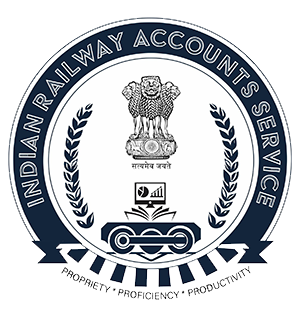 The new IRAS Logo assimilates the past, present and future to demonstrate the future ready IRAS which upholds the principles of “Propriety, Proficiency and Productivity”.
The logo has been carefully designed to demonstrate the nature of the service and contemporary times.
Adorned with the National Emblem, the logo symbolizes service to the Government of India. The Railway bogie resting on the track symbolizes that IRAS is dedicated to serving the Indian Railways, the three wheels represents evolution and motion, and upholding the motto of “Propriety, Proficiency and Productivity”. The book and the computer monitor symbolizes that IRAS is the fusion of both old and new methods of analysis, its ability to continuously evolve and embrace innovations, bridging the traditional methods of accounting and book-keeping with latest technology such as data analysis, AI etc. to propel IR to an upward growth trajectory.
Finally the 25 pairs of leaves on the logo represents the 17 Zonal Railways and 8 Production units which comprise India Railways. They also symbolizes wisdom, prosperity, motion and continuity.
The logo is a demonstration of the “FUTURE READY IRAS”.
Conceptualised and designed by Shri. Puneet Meena, Shri. Ajay Bartwal and Shri. Rajat Agarwal
The new IRAS Logo assimilates the past, present and future to demonstrate the future ready IRAS which upholds the principles of “Propriety, Proficiency and Productivity”.
The logo has been carefully designed to demonstrate the nature of the service and contemporary times.
Adorned with the National Emblem, the logo symbolizes service to the Government of India. The Railway bogie resting on the track symbolizes that IRAS is dedicated to serving the Indian Railways, the three wheels represents evolution and motion, and upholding the motto of “Propriety, Proficiency and Productivity”. The book and the computer monitor symbolizes that IRAS is the fusion of both old and new methods of analysis, its ability to continuously evolve and embrace innovations, bridging the traditional methods of accounting and book-keeping with latest technology such as data analysis, AI etc. to propel IR to an upward growth trajectory.
Finally the 25 pairs of leaves on the logo represents the 17 Zonal Railways and 8 Production units which comprise India Railways. They also symbolizes wisdom, prosperity, motion and continuity.
The logo is a demonstration of the “FUTURE READY IRAS”.
Conceptualised and designed by Shri. Puneet Meena, Shri. Ajay Bartwal and Shri. Rajat Agarwal
Monday, March 31, 2025
Professional Articles
An Alternative Approach to Capital Productivity and Resource Allocation on Indian Railways, Academic Foundation, 1996
Summary:
- An Alternative Approach to Capital Productivity and Resource Allocation on Indian Railways, Academic Foundation, 1996
Full Article:
I have published three books on Railway finance.
- An Alternative Approach to Capital Productivity and Resource Allocation on Indian Railways, Academic Foundation, 1996
This book points to inherent deficiency in the existing process of investment decision making and resource allocation process - which is basically a micro approach. It does not provide for assessment of total impact of total investments in a zonal railway over a period of time. This leads to mis-allocation of resources from productivity maximisation point of view. Even if such an exercise is attempted, the result is likely to be erroneous as the existing macro analysis tool viz. capital output ratio itself is not applicable to IR. The reasons are explained. Two new concepts of measuring capital productivity are then developed. After establishing the theoretical soundness of these concepts, the capital productivity of zonal railways over a twenty year period of time, for various time slices is analysed. Some discernible conclusions emerge based on which some macro criteria is suggested to be used in tandem with the micro criteria for allocation of budgetary resource.
- Readings in Indian Railway Finance, Academic Foundation, 1998
This is a collection of papers on Railway finance or related topics written by ex CRBs, FCs, transport economics and by me written specifically for this book or published earlier. These have been compiled and edited by me. The range of coverage is quite wide. Most of the papers either deal with controversial issues or advance some new ideas.
- Indian Railways : Strategy for Reforms, Cambridge University Press, October, 2014.
This book first introduces the reader to basic facts about Indian Railways and its physical as well as financial performance over a period of time. This is followed by a survey of reforms carried out in Japan, Sweden, United Kingdom, Germany, Russia and China and lessons to be learnt from them. It is then contended that IR must now be looked at from a totally different angle. It should be looked at as a commercial enterprise rather than as a ' commercial cum public utility service' as at present. Finally the ways and means to do so are proposed. Most of the suggestions are non-conventional, hence likely to be controversial.
I am not sure how many IRAS officers are aware of these books. Could you pl consider putting them up in IRAS site in suitable format.
I would like to suggest that since the last mentioned book is very topical you may like to put it in the streamer. All the three books are available on flipkart.
The first two books are in Rly Board library. I do not know whether they have procured the last one also.
Regards,
K.B.Verma
THE BOOKS ARE ALSO AVAILABLE ON FLIPKART.COM
Published on 27 January 2015
Please Login to Provide Your Innovative idea / Professional issue . If You are not a member of IRASTIMES.ORG then Click Here to Signup.
x







































































